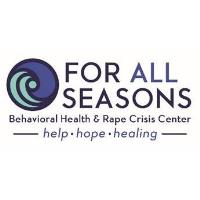-
Go
Pages
Members
Categories
Quicklinks
Events
-
For All Seasons Sponsors Maryland's Child Trafficking Regional Navigator Program: A Roundtable Discussion
October 17, 2024
For All Seasons recently hosted two Human Trafficking roundtable discussions for professionals in child advocacy, law enforcement, and social services in the Mid-Shore region. One session took place at the new Talbot County Health Department in Easton for participants from Talbot, Caroline, and Dorchester counties. The second was held at Queen Anne’s County Library for participants in Queen Anne’s and Kent counties.
According to Susan Ahlstrom, Human Trafficking Regional Navigator, “The goal of the roundtables was to bring our partners together to discuss state legislation and policies around the crime of Human Trafficking, as well as to address related challenges, barriers, or gaps in providing services and adequate response for victims. The group also explored opportunities for further training and technical assistance.”
Statewide representatives in attendance included Heather Amador, Director of Victim Services Policy Programs from the Governor’s Office of Crime, Prevention & Policy (GOCPP); Neil Mallon, Senior Research Specialist at the University of Maryland Baltimore School of Social Work (UMB SSW); and Antwan Chambers, Human Trafficking Administrator for the Maryland Department of Human Services/Social Services Administration (DHS SSA). These speakers shared information about the importance of the Regional Navigator Program and how the program has been implemented in Maryland. The Regional Navigator Program was born out of the Child Sex Trafficking Screening and Services Act of 2019. It was designed to respond to the rising trend in child sex trafficking and to improve networks for assisting survivors and their families.
“I don’t think that it would surprise anybody to hear that sometimes children who are involved with the Department of Social Services or Law Enforcement, have fears and have a variety of barriers to accessing resources and services. Because we understand that there is such a critical need for connection between those youth and the services that would help to prevent trafficking or intercept a victim who is being trafficked, the Navigator role was really designed to be in a neutral role like a rape crisis center or some type of a community center,” commented Heather Amador.
“It absolutely happens everywhere in the state. It’s just looking at it under the right lens sometimes. Although the Regional Navigator Program was established to deal with child cases, it’s absolutely not just a child issue. Trafficking transcends all age groups. It doesn’t have any socioeconomic or racial boundaries.”
Beth Anne Dorman, President & CEO of For All Seasons, introduced the state representatives and emphasized the important role of For All Seasons, and stated, “We’re here to support you and to not only share about what your role is as a mandated reporter, but to give you a lens into the Human Trafficking multidisciplinary team approach. Our program is designed to address the full spectrum of care, support, and prevention.”
“We’re not only committed to educating professionals and the general public, but we also are really helping folks to recognize the signs of trafficking. Our marketing and outreach campaign has been one of the most visible parts of the anti-human trafficking program and you’ve likely seen rack cards and billboards on Route 50. Within our education program, we really emphasize the importance of eliminating the stigmatization that happens for trafficking survivors; helping community members understand that victims often come from vulnerable, marginalized groups. It’s crucial to be able to approach the issue with a comprehensive, trauma-informed understanding.”
“It’s happening in our communities and in our neighborhoods. This comprehensive approach between the reporting, outreach, education, and care coordination, along with For All Seasons’ established Rape Crisis Center, therapy, and psychiatry services – that’s really what allows us to be a part of a comprehensive response,” stated Neil Mallon who helped the participants to understand the mandated reporter role in Maryland, where any professional that suspects child abuse or neglect is mandated to report that abuse to the local departments of social services.
Antwan Chambers explained that force, fraud, and coercion are the three things to look for. He added, “Getting people to talk about anything like that is not easy. Creating trust and asking questions like, is there ever any physical abuse or threat of physical violence in the home or relationship? Being trauma-informed when asking the type of questions to help draw it out is important. Survivors often don’t identify as victims of trafficking.”
“A person is not going to come up and openly identify a certain situation directly as trafficking. It’s kind of like looking under a rock a little bit for some of those other things that they may not realize are a problem. I think everybody has this stereotypical image of sex trafficking in their heads, and for some people, it involves tractor trailers and people being held captive, and white vans and things like that. Looking for the less obvious signs that there is some type of force, fraud, or coercion, and asking questions is what is important.”
Before closing the session, Dorman announced the upcoming launch of the For All Seasons self-paced, online Mandated Reporter course that will be released in October. She stated, “This will allow all partners involved in serving our vulnerable citizens to have free access to vital human trafficking information. The course is free and will offer CEUs for professionals who complete the program.”
The session also shared that as of October 1, 2024, mandated reporters will be required to report on labor trafficking. For further information about human trafficking and the For All Seasons Regional Navigator Program, visit https://forallseasonsinc.org/what-we-do-how-we-help/services/anti-human-trafficking/.For All Seasons, Inc.
-
Katie Theeke
- October 17, 2024
- (410) 820-7007
- Send Email
-
-
Upcoming Events
-
-
-
Upcoming Events
-
Dorchester Chamber of Commerce
© Copyright 2025 Dorchester Chamber of Commerce. All Rights Reserved. Site provided by GrowthZone - powered by ChamberMaster software.



